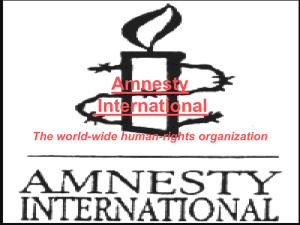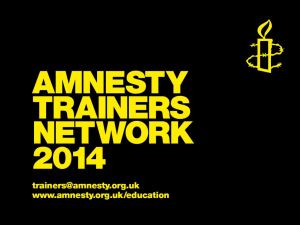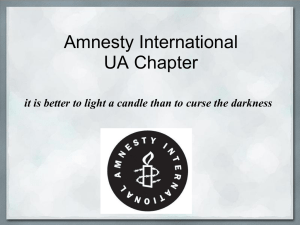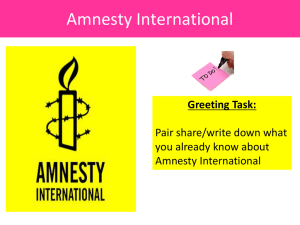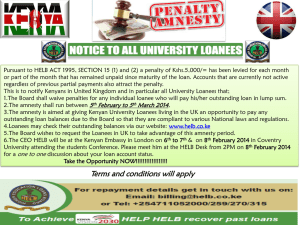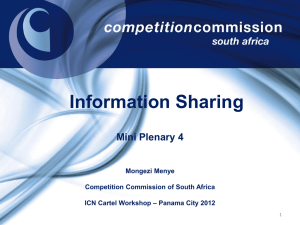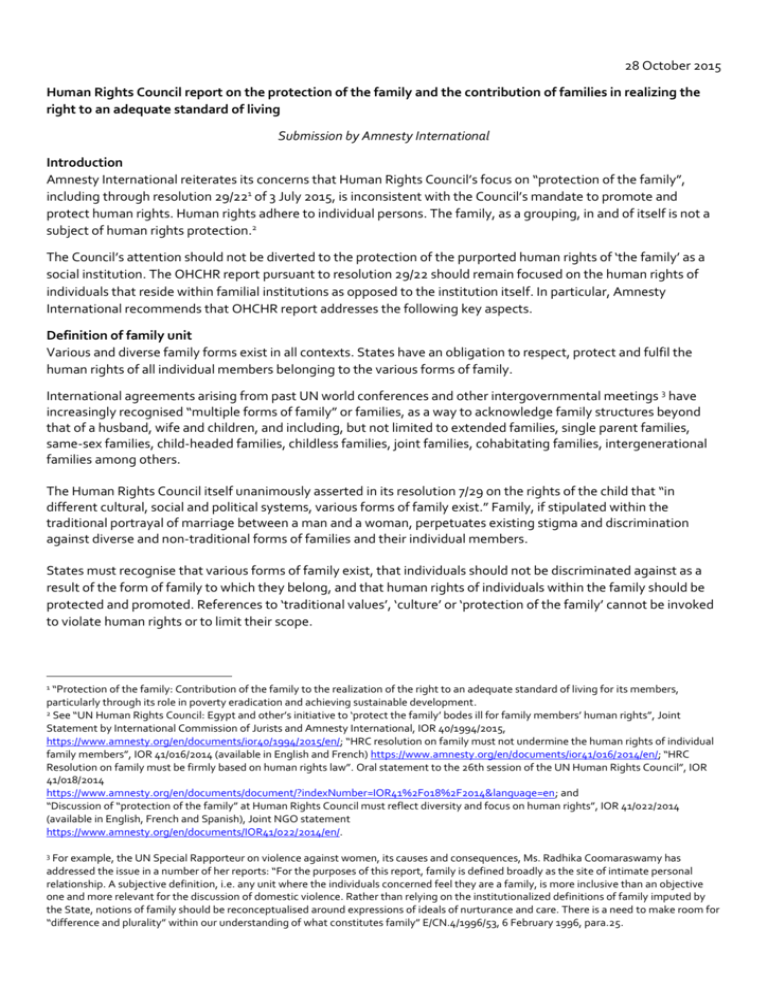
28 October 2015
Human Rights Council report on the protection of the family and the contribution of families in realizing the
right to an adequate standard of living
Submission by Amnesty International
Introduction
Amnesty International reiterates its concerns that Human Rights Council’s focus on “protection of the family”,
including through resolution 29/221 of 3 July 2015, is inconsistent with the Council’s mandate to promote and
protect human rights. Human rights adhere to individual persons. The family, as a grouping, in and of itself is not a
subject of human rights protection.2
The Council’s attention should not be diverted to the protection of the purported human rights of ‘the family’ as a
social institution. The OHCHR report pursuant to resolution 29/22 should remain focused on the human rights of
individuals that reside within familial institutions as opposed to the institution itself. In particular, Amnesty
International recommends that OHCHR report addresses the following key aspects.
Definition of family unit
Various and diverse family forms exist in all contexts. States have an obligation to respect, protect and fulfil the
human rights of all individual members belonging to the various forms of family.
International agreements arising from past UN world conferences and other intergovernmental meetings 3 have
increasingly recognised “multiple forms of family” or families, as a way to acknowledge family structures beyond
that of a husband, wife and children, and including, but not limited to extended families, single parent families,
same-sex families, child-headed families, childless families, joint families, cohabitating families, intergenerational
families among others.
The Human Rights Council itself unanimously asserted in its resolution 7/29 on the rights of the child that “in
different cultural, social and political systems, various forms of family exist.” Family, if stipulated within the
traditional portrayal of marriage between a man and a woman, perpetuates existing stigma and discrimination
against diverse and non-traditional forms of families and their individual members.
States must recognise that various forms of family exist, that individuals should not be discriminated against as a
result of the form of family to which they belong, and that human rights of individuals within the family should be
protected and promoted. References to ‘traditional values’, ‘culture’ or ‘protection of the family’ cannot be invoked
to violate human rights or to limit their scope.
1 “Protection
of the family: Contribution of the family to the realization of the right to an adequate standard of living for its members,
particularly through its role in poverty eradication and achieving sustainable development.
2 See “UN Human Rights Council: Egypt and other’s initiative to ‘protect the family’ bodes ill for family members’ human rights”, Joint
Statement by International Commission of Jurists and Amnesty International, IOR 40/1994/2015,
https://www.amnesty.org/en/documents/ior40/1994/2015/en/; “HRC resolution on family must not undermine the human rights of individual
family members”, IOR 41/016/2014 (available in English and French) https://www.amnesty.org/en/documents/ior41/016/2014/en/; “HRC
Resolution on family must be firmly based on human rights law”. Oral statement to the 26th session of the UN Human Rights Council”, IOR
41/018/2014
https://www.amnesty.org/en/documents/document/?indexNumber=IOR41%2F018%2F2014&language=en; and
“Discussion of “protection of the family” at Human Rights Council must reflect diversity and focus on human rights”, IOR 41/022/2014
(available in English, French and Spanish), Joint NGO statement
https://www.amnesty.org/en/documents/IOR41/022/2014/en/.
3
For example, the UN Special Rapporteur on violence against women, its causes and consequences, Ms. Radhika Coomaraswamy has
addressed the issue in a number of her reports: “For the purposes of this report, family is defined broadly as the site of intimate personal
relationship. A subjective definition, i.e. any unit where the individuals concerned feel they are a family, is more inclusive than an objective
one and more relevant for the discussion of domestic violence. Rather than relying on the institutionalized definitions of family imputed by
the State, notions of family should be reconceptualised around expressions of ideals of nurturance and care. There is a need to make room for
“difference and plurality” within our understanding of what constitutes family” E/CN.4/1996/53, 6 February 1996, para.25.
Human rights violations within the family
States have an immediate and on-going obligation to ensure equality and non-discrimination, respect, protect and
fulfil the human rights of all individuals, including within the family. However, Amnesty International has
documented numerous instanced where family members have perpetrated human rights abuses, in particular
against women and girls, including when justified for reasons of ‘tradition’, ‘custom’ or ‘religion’. Gender-based
discrimination and violence within the family constitutes a human rights abuse in itself and leads to other human
rights abuses and violations limiting the ability of women and girls, and individuals of diverse gender identities and
sexual orientations, to fully enjoy their personal autonomy and sexual and reproductive health and rights. Amnesty
International has documented cases of gender-based violence within the family targeting women and girls
including domestic violence;4 sexual violence and incest;5 crimes committed in the name of so-called ‘honour’,6 as
well as forced, early and child marriage7. We have also documented the denial of autonomy to women and girls to
make decisions about their sexual and reproductive health, leading to maternal mortality and morbidity 8 and denial
of education to girls due to gender discrimination, stereotyping and violence.9
States have an obligation to tackle all forms of discrimination, violence and human rights violations, including
within the context of the family. States must also implement specific policies and programmes to promote human
rights for all, and eradicate discriminatory cultural norms and social attitudes. Such policies and programmes should
target all community members including men, boys, and families, and should address the attitudes and beliefs that
lie at the core of gender-based discrimination and violence.
Rights of LGBTI persons
Laws, which criminalize consensual sexual conduct between adults, including same-sex intimacy, violate the right
to privacy as well as the right to family life of LGBTI persons. The UN Human Rights Committee’s landmark decision
of Toonen v. Australia set the international standard for the protection of consensual adult sexual conduct under
article 17 of the ICCPR.10 LGBTI individuals in countries that penalize same-sex intimacy do not only face the
imminent threat of arrest and prosecution but also are restricted by law to marry and found a family with the person
of their choosing.
Even in countries that do not criminalize same sex intimacy, LGBTI persons face discrimination and are denied full
enjoyment of their economic and social rights, such as housing, healthcare and employment.11 This prevents LGBTI
individuals and their families from enjoying their right to an adequate standard of living and fully participating in
development.
4
Amnesty International, Violence is not just a family affair: Women face abuse in Tajikistan, EUR 60/001/2009,
https://www.amnesty.org/en/documents/EUR60/001/2009/en/; Amnesty International, No pride in silence: Countering Violence in the Family in
Armenia, EUR 54/004/2008, https://www.amnesty.org/en/documents/eur54/004/2008/en/
5 Amnesty International, Listen to their voices and act: Stop the rape and sexual abuse of girls in Nicaragua, AMR
43/008/2010, https://www.amnesty.org/en/documents/amr43/008/2010/en/; Amnesty International, ‘I am at the lowest end of all’. Rural
women living with HIV face human rights abuses in South Africa, AFR 53/001/2008,
https://www.amnesty.org/en/documents/AFR53/001/2008/en/
6 Amnesty International, Afghanistan: 10-year old rape survivor faces ‘honour killing’, ASA 11/013/2014,
https://www.amnesty.org/en/documents/asa11/013/2014/en/
7 Amnesty International, Morocco: Amendment of rape provision is a step in the right direction,
https://www.amnesty.org/en/latest/news/2014/01/morocco-amendment-rape-provision-step-right-direction/
8 Amnesty International, Giving life, risking death: Maternal mortality in Burkina Faso, AFR 60/001/2009,
https://www.amnesty.org/en/documents/document/?indexNumber=afr60%2F001%2F2009&language=en; Amnesty International, Out of
Reach: The cost of maternal health in Sierra Leone, AFR 51/005/2009, http://www.amnestyusa.org/sites/default/files/pdfs/outofreach.pdf
9 Amnesty International, Women and Girls in Tajikistan: Facing violence, discrimination and poverty, EUR 60/002/2009,
https://www.amnesty.org/en/documents/EUR60/002/2009/en/; Amnesty International, Sierra Leone: Pregnant girls’ right to education at risk,
AFR 51/1309/2015, 25 March 2015, https://www.amnesty.org/en/documents/AFR51/1309/2015/en/
10
See Toonen v. Australia, (CCPR/C/50/D/488/1992), UN Human Rights Committee, 4 April 1994, available at
http://www.unhcr.org/refworld/docid/48298b8d2.html; see also UDHR, art. 12, ICCPR, art. 17 and HRC, Concluding observations of the Human
Rights Committee: Chile, UN Doc. CCPR/C/79/Add.104, 30 March 1999, para. 20: “The continuation in force of legislation that criminalizes
homosexual relations between consenting adults involves violation of the right to privacy protected under article 17 of the Covenant and may
reinforce attitudes of discrimination between persons on the basis of sexual orientation.”
11 See A/HRC/19/41
Report of the United Nations High Commissioner for Human Rights: Discriminatory laws and practices and acts of
violence against individuals based on their sexual orientation and gender identity, 17th June 2011, para 51-57
Right to marry and found a family for transgender individuals
As legal marriage remains the primary legal means to form a family, transgender individuals face various barriers to
accessing this legal and social institution in all regions. Amnesty International has raised concerns on the violation
of the right to marry and found a family for transgender individuals in the context of legal gender recognition in
Europe.12 Countries such as Italy or Finland for example, require applicants for legal gender recognition to not be
married, therefore forcing transgender individuals to consider divorce in order to have their gender recognised.
Some States argue that this discriminatory requirement stems from the prohibition on same-sex civil marriages in
their jurisdictions. The European Court of Human Rights has clarified that the notion of family life equally applies to
same-sex couples, irrespective of the legal regime applicable to them under domestic jurisdiction13. The right to
found a family may also be violated by States where procedures on legal gender recognition and gender
reassignment contain the mandatory requirement of irreversible sterilisation.14 In both cases when divorce or
sterilisation are required, transgender individuals face the excruciating dilemma of either being acknowledged by
the State and enjoying equal recognition before the law, or preserving their reproductive rights and their right to
marry and found a family.
Recommendations
Amnesty International encourages OHCHR in preparing its report pursuant to Human Rights Council’s resolution
29/22 to:
Focus on the protection and promotion of the human rights of individuals within diverse forms of family as
opposed to the protection of the institution of the family itself;
Use gender neutral language when referring to the family unit as opposed to references to ‘man’ and
‘woman’, accounting for the diverse forms of family;
Explore and reflect in the report diverse forms of family and urge States to apply human rights standards
and law, and adopt state policies that reflect the existence and needs of diverse families;
Reiterate its concerns on criminalization of same-sex conduct and prohibition of same-sex unions to
facilitate tolerance and non-discrimination against LGBTI individuals who wish to exercise their right to
marry and found a family;
Acknowledge that concepts such as ‘traditions’, ‘morals’, ‘heritage’ and ‘values’ are ambiguous and have
often been used to justify the marginalization of minority groups and gender-based inequalities,
discrimination and violence, including in the context of the family, and reaffirm that such concepts may not
be invoked to violate human rights nor to limit their scope;
Urge States to implement their international human rights obligations to ensure equality and nondiscrimination for all, and to respect, protect and fulfill the rights of all individuals, including within the
context of the family;
Urge States to adopt all appropriate measures to tackle gender-based discrimination and violence within
the family leading to other human rights violations, including through public education and awareness
raising to transform discriminatory cultural norms and social attitudes;
Urge States to develop both in policy and practice a culture of tolerance and non-discrimination towards
diverse forms of family, and accord legal recognition to the diverse family forms which exist and which are
entitled to protection, rather than recognising marriage between a man and a woman as the sole legal
means to form a family;
12
Amnesty International, The state decides who I am: Lack of legal gender recognition for transgender people in Europe, January 2014, Index:
EUR 01/001/24 https://www.amnesty.org/en/documents/eur01/001/2014/en/
13
For example the Court found in the case Schalk and Kopf v Austria that the reference to "men and women" in the ECHR no longer means
that "the right to marry enshrined in Article 12 must in all circumstances be limited to marriage between two persons of the opposite sex."
The court also stated: “[I]t is artificial to maintain the view that, in contrast to a different-sex couple, a same-sex couple cannot enjoy ‘family
life’ for the purposes of Article 8.” See, Schalk and Kopf v Austria, Application no. 30141/04, para94.
14 Amnesty International, The state decides who I am: Lack of legal gender recognition for transgender people in Europe, January 2014, Index:
EUR 01/001/24 https://www.amnesty.org/en/documents/eur01/001/2014/en/
Urge States to remove any restrictions to the right to marry and found a family during the legal gender
recognition process, particularly in relation to divorce as well as to remove the requirement of sterilization
for legal gender recognition and gender reassignment.

